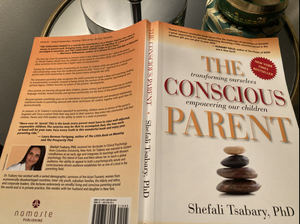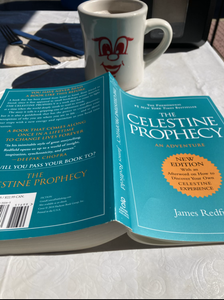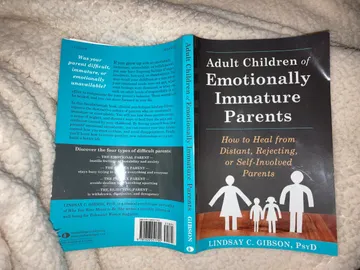In more ways than one, this book made me reflect on my own childhood and upbringing on how the unconscious habits of the village that brought me up, impacted me today. This book was more about how being a conscious person underpins being a conscious parent. Some parts made me cry, call my sister and say “can you relate!” and overall just reflect upon the type of parent I want to be. What I appreciated about this book, different from other books I have read as a single parent, was it addressed you as an individual. It didn’t leave me feeling like I could only accomplish some of the practices set forth in it, with a partner. That alone was enough to keep me intrigued. Whether you are a single parent, in a relationship, even a teacher, this book has spiritual gold to help you along the way. I will share a few tidbits that touched me deeply.

1. “You will only accept your child to the degree you accept yourself”In this section Shefali Tsabary, PhD discussed how it is easy for a parent to forget or not even be conscious that their child has an independent mind that might include behaviors you weren’t quite ready for. Essentially, rather than labeling her child as “manipulative” she embraced that her child was a little more “street smart” than she had given credit for.
What this section meant for me was thinking back to times when I might have been labeled as a child for my own expression of freedom, navigating the world blindly. I was carrying on in the only ways I knew, so if a behavior became too much for my village to handle rather than correcting the behavior I would be labeled. When you are young and independent you have a true sense of yourself sometimes, perhaps more courageous than your family.
Their fear can be channeled to become your fear at such an impressionable young age. She goes on to say “How can we raise another human being, another spirit, if our own being has been largely dismissed, our spirit systematically squelched?” For me this speaks to my inherently independent spirit where I wanted to learn from my mistakes, not feel pigeonholed and have the freedom to fail. I know this now because today, that is still how I operate. However for someone that can’t accept themselves and whatever it is that is true for them, indeed, how can they accept another? 2. “Few Parents can allow their children to exist without seeing them as an extension of their own ego.”
In this section she discusses how much ego breeds dysfunction, which is entirely accurate. When children are used to fill an unmet need within us, how are we truly loving them? It can’t be whole. It becomes conditional. Even in adult relationships, this is true. When children are thought of as an extension of us beyond mere genetics, we run the risk of putting unnecessary pressure on them in areas that they themselves can’t rise to the occasion because it might not be inherently innate in them and that is okay. As individuals, they have to have the freedom to not live from a projection of our own psyche.
Whether that is deciding from early on they are going to be a star, a basketball player or some other fantasy of a person we subconsciously wanted as a partner or even wanted to be ourselves. She beautifully explains how living authentically allows them to journey with us, not for us. “…seeing them instead as fellow travelers on the journey.” 3. “The more we hone this ability to meet life in a neutral state, without attributing “goodness” or “badness” to what we are encountering, but simply accepting its as-is-ness, the less our need to interpret every dynamic as if it were about us.”
Ah the above spoke to me on so many levels…need I say much more? This section addressed emotional drama and how everyone must have the freedom to express their emotions no matter how uncomfortable that might be for you. Children need to be taught and you must demonstrate emotional regulation, less they go down a self-destructive path to numb their emotions. I am sure at one point or another we have all dealt with or know someone who has done this. All I can have after really understanding what she said here was, compassion. I have been totally guilty of judging emotions without considering how hard it must be for the other person and have been on the receiving end of that judgment too. However, that is what evolving is all about. RECOGNIZING, where even you can do better and not shaming yourself for having not done so in the past.
There are so many nuggets of wisdom in this book and it would behoove me to stop now before your eyes get tired with me trying to cover every part that touched me. Overall, this book is Spiritual Gold. I have purchased and read books on mommy issues and daddy issues, yet this one seemed to cover it all because it just gets down to the basics, consciousness. Once you become conscious of yourself, you become conscious of the world around you and have a lot more compassion and forgiveness to go around. My Rating: 5/5



